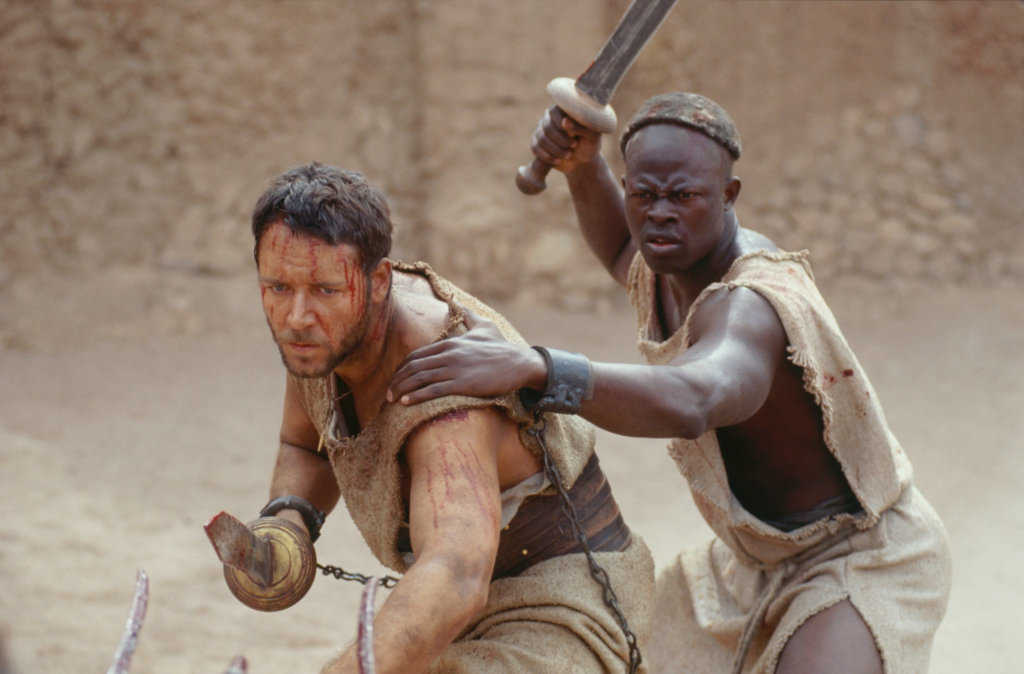Text originally written and published in 2017.
Copyright ©AnaLuciaAraujo. May not be reprinted without permission.

Photograph: Gladiator, 2000.
For a long time now we have had this discussion on the use of the word “slave” and “enslaved” to refer to men, women, and children who had the legal status of slave or slaves.
It has been argued that the use of the term “slave” is offensive because being a slave is a state and not intrinsic to people who lived in bondage and that the term “enslaved” gives agency to the person held in bondage.
I use slave and enslaved interchangeably mainly to avoid repetition. I believe that using enslaved instead of slave is not sufficient to give agency to historical actors. Also, the historical actors themselves often used the term “slave” to refer to themselves and even to the associations they created to fight for example for reparations.
But as I have to play with these words in English (I already mentioned here that the use of esclavisé or escravizado or esclavizado risks not work), I conducted a quick research on Google books to see how the terms “slave” and “enslaved” have been used.
For quantification matters, several history books below use BOTH terms “slave” and “enslaved” to refer to people who were held in bondage. In other words, even those who started using the term enslaved and had put the term in the title of their works, still use “slave” in several instances. Apparently, there is no logic for the use of slave in one place and enslaved in another place.
Also, it is curious to see that in some cases the term “enslaved” is used to refer to labor, like in “enslaved labor” and “enslaved workforce” which I believe is not an attempt to give agency to labor or to workforce.
As you can see from the list below, authors are men and women, black, white, or brown, and several of these books using “slave” and “enslaved” received awards.
Bales, Kevin and Ron Soodalter. The Slave Next Door: Human Trafficking and Slavery in America Today, 2009.
Dunbar, Erica. Never Caught: The Washingtons’ Relentless Pursuit of Their Runaway Slave, Ona Judge, 2017.
Ferreira, Roquinaldo. Cross-Cultural Exchange in the Atlantic World: Angola and Brazil during the Era of the Slave Trade, 2012.
Ferrer, Ada. Freedom’s Mirror: Cuba and Haiti in the Age of Revolution, 2014.
Foner, Eric. Gateway to Freedom: The Hidden History of the Underground Railroad, 2015.
Fuentes, Marisa J. Dispossessed Lives: Enslaved Women, Violence, and the Archive, 2016.
Gordon-Reed, Annette. The Hemingses of Monticello: An American Family, 2008.
McKinley, Michelle A. Fractional Freedoms: Slavery, Intimacy, and Legal Mobilization in Colonial Lima, 1600-1700, 2016.
Miller, Joseph C. The Problem of Slavery as History: A Global Approach, 2012.
Mustakeem, Sowande M . Slavery at Sea: Terror, Sex, and Sickness in the Middle Passage, 2016.
Schwartz, Marie Jenkins. Birthing a Slave Motherhood and Medicine in the Antebellum South, 2011.
Sinha, Manisha. The Slave’s Cause: A History of Abolition, 2016.
Sweet, James Hoke. Domingos Álvares, African Healing, and the Intellectual History of the Atlantic World, 2011.
Wilder, Craig Steven. Ebony and Ivy: Race, Slavery, and the Troubled History of America’s Universities, 2013.
